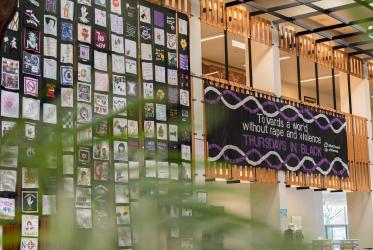Following the recently held World Council of Churches 11th Assembly, the fellowship dedicated the month of November to intensifying efforts aimed at eradicating rape and all forms of sexual and gender-based violence on the way to promoting justice, peace, and reconciliation.
On 21 November, the fellowship featured activities on breaking the silence around sexual and gender-based violence in theological institutions and churches as a preparatory step towards launching the Thursdays in Black advocacy campaign and the 16 Days of Activism activities.
Rev. Lydia Chemei, a PhD theology student, conducted a biblical reflection on the rape of Tamar by Amnon in 2 Samuel 13. She urged her fellow students and lecturers to do whatever is possible to ensure that no other woman experiences the humiliation and pain that Tamar did. Chemei’s reflection was followed by a testimony from a woman clergy who experienced sexual harassment from her stepfather while she was a child.
“Resisting my stepfather’s advances left me without school fees but I was later promised a scholarship that would help me continue studying. To my disappointment, the priest in charge of the fund asked me for sex in exchange for the scholarship. I could not go that way and as a result, I completely dropped out of school until God made another way for me,” Rev. Wambui narrated. (Wambui is a pseudoname).
Godfrey Adera, a PhD student, engaged the lecturers in a question-guided panel discussion responding to the biblical reflection and testimony. Participants in this panel included Dr Kevin Muriithi, head of the Department Practical Theology; Rev. Dr Julius Kithinji, dean; and others.
All panelist agreed that sexual and gender-based violence is a sin that is condemned by God in the Bible and all Christians have a moral duty to ensure that their relations are free from violence. Acknowledging that the church is a work in progress with spaces that are not safe for everyone in the context of sexual and gender-based violence, Muriithi highlighted the need for theologians at all levels to advocate for church structures, leadership, and policies that allow people to speak up and name the evils happening around them.
Tracy Likoko, student vice president, appreciated the fellowship leaders for opening their space for such honest dialogues on sexual and gender-based violence. She expressed deep gratitude to Wambui for giving a face to the stories of biblical characters like Tamar and noted that sexual and gender-based violence is still one of the major challenges among university students throughout the country. Likoko also invited the students to actively participate in the upcoming 16 Days of Activism in all possible ways.
In his remarks, the student in charge of organizing the fellowship, Kevin Maina (a third-year student pursuing a bachelor of divinity degree), called upon all participants to take an active role in the WCC’s Thursdays in Black campaign. The campaign’s official launch at the school of theology will take place on 24 November. He also urged fellow students to advocate for gender justice for their own good and for the sake of their loved ones.
In his closing remarks, Kithinji applauded his students and staff for leading the way in creating safe spaces for promoting gender justice not only in their university but in all their spheres of influence. He encouraged the students to mobilize their colleagues for the official launch of Thursdays in Black.
“I always thought that a fellowship is all about praying, singing, and preaching until today. Today was my first time to see a priest share her experiences of sexual abuse and I have learnt a lot of new things in this fellowship.” said Mike Odhiambo, an education student who attended the fellowship.







